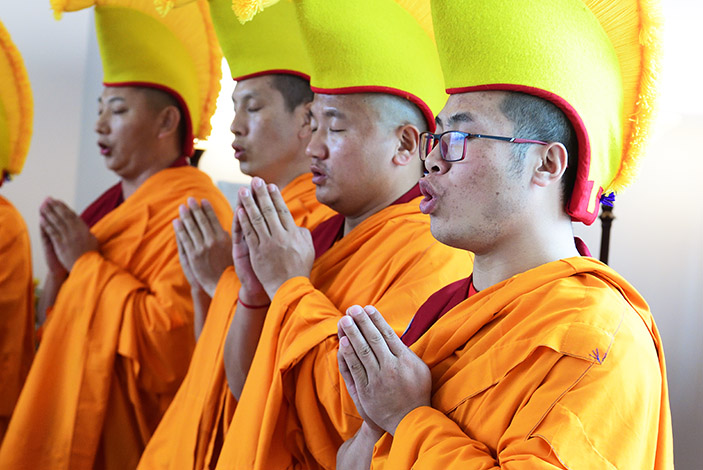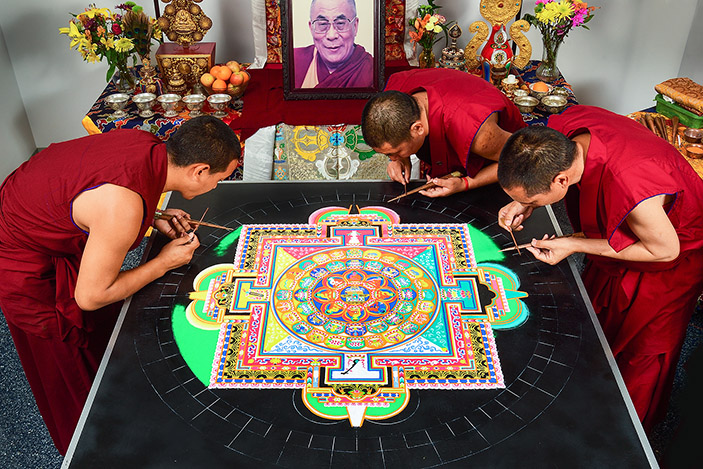With a deep focus on compassion, inspired by that of Tibetan monks from the Drepung Loseling Monastery in South India, Emory introduces a new initiative called Compassion-Centered Spiritual Health or CCSH. The CCSH concept is built upon coping techniques and methods of healing during stressful times.
“Compassion-Centered Spiritual Health is based on the premise that each of us has inner resources that we can call upon in the midst of a crisis or in moments of challenge,” says George H. Grant, MDiv, PhD, executive director for Emory Healthcare Spiritual Health. “This research-based interventional approach, derived from Cognitively-Based Compassion Training or CBCT, is used to alleviate distress in patients and families and to mitigate burnout in health care professionals.”
CBCT is a system of contemplative exercises designed to strengthen and sustain compassion. Practices include training in attentional stability and increased emotional awareness, as well as targeted analytical reflections to understand better one’s relationship with self and others. The exercises seek insights into the way a person’s mindsets and attitudes can be shifted to support personal resiliency, to foster an inclusive and more accurate understanding of others and ultimately to intensify altruistic motivation.
The CCSH-joint initiative is the work of Emory Healthcare Spiritual Health and the Center for Contemplative Science and Compassion-Based Ethics at Emory University, a center that supports a research-based approach to educating both heart and mind.
Emory has had a connection with the monks from the Drepung Loseling Monastery since 1999. Called the Emory-Tibet Partnership, the unique educational endeavor brings together the best of the Western and Tibetan Buddhist intellectual traditions for their mutual enrichment and for the discovery of new knowledge.
Last month, Emory Healthcare staff, visitors, patients and physicians embraced ancient culture as more than a dozen monks created a sand mandala at Emory University Hospital. The ancient Tibetan-Buddhist tradition involves the use of colored sand to create a graphic depiction of the universe, and in this case, a mandala emphasizing the role of compassion and healing was chosen. Before the monks began work, they performed an opening ceremony with chanting, believed to generate energies conducive to healing.
Emory Healthcare’s Spiritual Health department and the Center for Contemplative Science and Compassion-Based Ethics at Emory organized the event and welcomed the monks to the hospital, where they spent a week creating the sand mandala.
“The spiritual art created by the monks represents the balance needed to heal and have good health; originally used in contemplative practice, mandalas are a way of depicting the harmony of the universe, including the harmony of the body and mind,” says Lobsang Tenzin Negi, PhD, executive director of the Center for Contemplative Science and Compassion-Based Ethics. “This rich Tibetan tradition can help us closer to home at Emory support the wellbeing and compassion of all individuals, including patients, caregivers, staff and more.”
“This expression and other ancient spiritual practices can teach us how to help others move through challenging experiences in health care with grace and compassion,” says Grant, who is working on fostering a culture of compassion throughout the entire Emory Healthcare system. “It also brings mindfulness to the importance of understanding other cultures inclusive of persons from all faith traditions, as well as those who consider themselves to be non-religious.”
Upon completion of the sand mandala at Emory University Hospital, the artwork was ritualistically dismantled by the monks, placing the sand in various tributaries of water where it was released back into nature.





